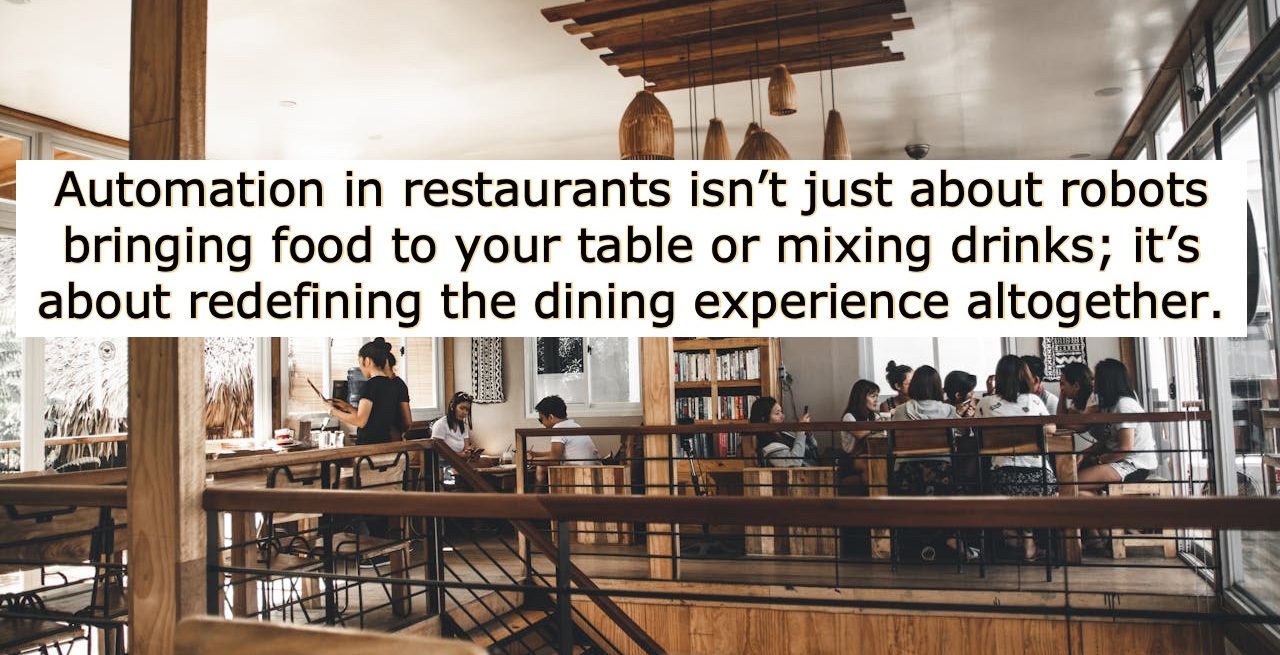AI and Robotic Revolution: A Glimpse into the Future of the Restaurant Industry
4 Min Read By John Felico
Imagine this: It’s the year 2035. You walk into your favorite restaurant, but there’s no human host to greet you at the door. Instead, you're welcomed by Tao, a sleek robot host programmed to seat you efficiently based on your preferences, even remembering your favorite booth from past visits. You take your seat at a table embedded with a touchscreen menu. Tap a few buttons, and your order is sent to the kitchen, where robots are preparing dishes with precision, ensuring perfect consistency every time.
Need a drink? Walk over to the bar where Tipsy, the robotic bartender with eight arms, prepares your cocktail with speed and accuracy that would put the most seasoned mixologist to shame. Your drink is poured and waiting within seconds. Throughout the meal, robot servers deliver your food and clear the table when you're done.
Sounds far-fetched, right? But this isn’t some distant sci-fi fantasy. This technology already exists today. Tipsy is a real robotic bartender at the Miracle Mile Shops in Las Vegas, mixing drinks for customers as we speak. Pudu Robotics and Bear Robotics are deploying food-running robots in restaurants across the globe. Tao, the host developed by Keennon Robotics is being tested in Asia and has expanded to other regions, including Europe and the United States.
The Tech That’s Already Here
Automation in restaurants isn’t just about robots bringing food to your table or mixing drinks; it’s about redefining the dining experience altogether. Think about the touch-screen ordering systems at fast-food chains, or the self-serve kiosks at McDonald's. These systems are not just about convenience—they’re part of a larger shift toward efficiency, minimizing human error, and reducing labor costs.
Companies like Bear Robotics offer robots like Servi, designed to act as food runners and table bussers. No more waiting for an overworked server to bring your food—Servi glides through the dining room, expertly avoiding obstacles to bring plates to the table. It’s happening in restaurants across the United States, and you can already see it in action in chains like Denny’s and Chili’s.
Even kitchens are evolving. Miso Robotics has developed Flippy, an AI-driven robot capable of flipping burgers and frying food. Flippy can work alongside human chefs or replace them altogether in high-volume settings. Several fast-food chains have already adopted Flippy in pilot programs, making it clear that the days of a fully robotic kitchen are not far off.
A Cautionary Tale for Those Left Behind
As the millennials I spoke to struggled to imagine a world where robots take over all jobs, I couldn't help but feel a pang of empathy. They weren't alone. Many people can’t fathom this future. It’s terrifying to think about the implications—mass unemployment, a world where human labor is obsolete. And yet, here’s the truth: the revolution is already happening, and it’s accelerating faster than we might want to believe.
For example, once fully automated kitchens and robot servers are perfected, there will be little need for human staff in many restaurants. Why pay a human bartender when Tipsy can mix drinks faster, cheaper, and without breaks? Why hire food runners when Servi can handle the job without missing a beat? And with robots like Tao greeting customers at the door, even front-of-house roles might be at risk.
Some might think, “Well, jobs will shift, right? People will find new roles.” But what if they don't? In a world where robots handle every aspect of farming, 3D print houses on demand, and automate the production of everything from food to clothing, what will be left for humans to do? Perhaps, as Mark Cuban suggested, there may come a day when the traditional concept of “work” disappears entirely. With robots producing everything we need, money may no longer be necessary. Housing, food, clothing—all created by machines, all available in abundance.
In such a future, humans may no longer work to survive. Instead, we might spend our days pursuing creativity, learning, and leisure. It sounds utopian, but let’s not gloss over the reality: the transition will be painful. Many industries will struggle to adapt, and millions of people could find themselves out of work, with few skills relevant to this new world.
What Does the Future Hold?
Here’s the harsh reality: we don’t know what’s on the other side of this revolution. But we do know it’s coming, and it's coming fast. The restaurant industry is one of the first to feel the shift, but no industry is immune. While companies experiment with automating the front-of-house and kitchens today, tomorrow, entire sectors could be reimagined through AI and robotics.
Mark Cuban’s warning should be taken seriously. If we don’t start preparing for this future now—if we don’t start educating ourselves and embracing new technologies—there will be a significant divide between those who have adapted and those who are left behind. Restaurants that cling to traditional models, relying on human labor and ignoring the potential of automation, could find themselves obsolete in the next decade.
The technology is already here. The question is, are we ready for it? Are we prepared to rethink what work means? Because if we don’t, the future will arrive, and we’ll be watching from the sidelines as robots and AI take over.
As I left that conversation with the two young executives, I couldn’t help but wonder: are we truly ready to face a world where human labor is no longer needed? Because that world is closer than we think. And the restaurant industry is just the beginning.

